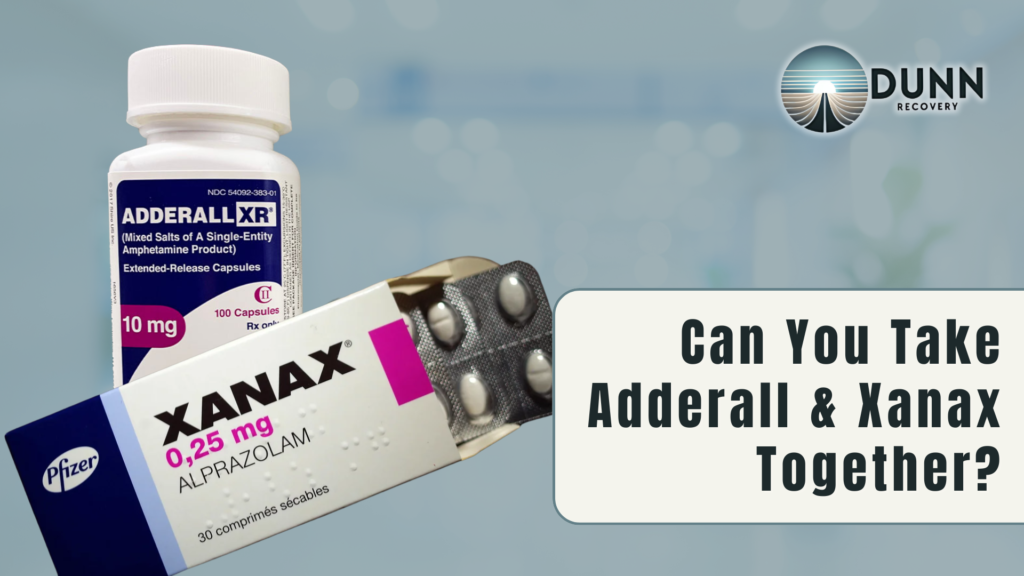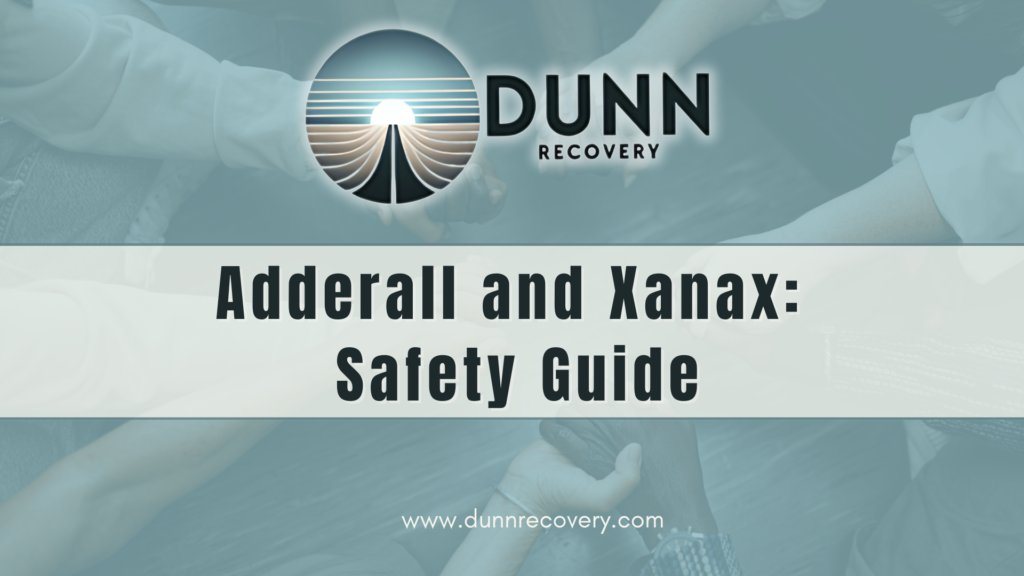Prescription medications play a crucial role in treating various mental health conditions, but understanding how they work—especially when multiple medications are involved—is essential for patient safety. Two commonly prescribed medications, Adderall and Xanax, serve different purposes in mental health treatment but require careful consideration when used together. At Dunn Recovery, we believe that education is fundamental to recovery and safe medication management.
What Are Adderall and Xanax?
Adderall stimulates the central nervous system as a medication that doctors primarily prescribe for attention-deficit/hyperactivity disorder (ADHD) and narcolepsy. It contains a combination of amphetamine and dextroamphetamine, which increases the activity of certain neurotransmitters in the brain, particularly dopamine and norepinephrine. These neurotransmitters help control attention, focus, and impulse regulation.
Xanax (alprazolam) belongs to a class of medications called benzodiazepines. Doctors commonly prescribe it to treat anxiety disorders, panic attacks, and sometimes as a short-term solution for severe anxiety symptoms. Xanax enhances the effects of gamma-aminobutyric acid (GABA), a neurotransmitter that inhibits brain activity, creating a calming effect on the central nervous system.
These medications have fundamentally different effects—Adderall stimulates the central nervous system, while Xanax depresses it. This opposing action is precisely why their interaction requires careful medical supervision and why combining them without professional guidance can be dangerous.
Is Adderall a Benzo?
A common misconception is thinking that Adderall and Xanax belong to the same medication class. This is not true. Adderall is not a benzodiazepine (benzo).
Adderall is a stimulant medication containing amphetamine salts. It increases brain activity, alertness, and energy levels. It belongs to a class of medications known as central nervous system stimulants.
Xanax, on the other hand, is a benzodiazepine. Benzodiazepines are a class of psychoactive drugs that work by enhancing the effect of GABA, resulting in sedative, hypnotic, anxiolytic, anticonvulsant, and muscle relaxant effects. Other common benzodiazepines include Klonopin (clonazepam), Ativan (lorazepam), and Valium (diazepam).
The distinction between these medication classes is crucial for understanding their effects, risks, and potential interactions. This fundamental difference in their mechanisms of action explains why combining them can produce complex and potentially dangerous physiological responses.
Adderall and Xanax Interactions
When considering adderall and xanax interactions, it’s important to understand that combining these medications can lead to complex physiological responses due to their opposing mechanisms. These medications affect different neurotransmitter systems and produce effects that can counteract each other in unpredictable ways.
Potential interactions include:
- Opposing effects: Adderall stimulates the central nervous system while Xanax depresses it. This opposition can create unpredictable effects and may reduce the effectiveness of both medications. The stimulant properties of Adderall might diminish the calming effects of Xanax, while Xanax might reduce the focus-enhancing effects of Adderall.
- Increased side effects: The combination may increase the risk of side effects from both medications. For example, Adderall can cause increased heart rate and blood pressure, while Xanax can cause drowsiness and respiratory depression. When taken together, these effects might be amplified or manifest in unexpected ways.
- Masked symptoms: Adderall may mask the sedative effects of Xanax, potentially leading to overconsumption of Xanax. This masking effect can create a dangerous cycle where a person feels the need to take more Xanax to achieve the desired calming effect, increasing the risk of benzodiazepine overdose.
- Cardiovascular strain: Adderall can increase heart rate and blood pressure, while Xanax may have the opposite effect. This can place additional strain on the cardiovascular system as it attempts to regulate these conflicting signals.
At Dunn Recovery, our medical professionals carefully evaluate each patient’s unique situation before determining appropriate medication regimens, always prioritizing safety and effectiveness.
Can You Take Adderall and Xanax Together?

The question of whether you can take adderall and xanax together requires a nuanced answer. While some physicians may prescribe both medications concurrently in specific circumstances, this should only occur under strict medical supervision and for legitimate medical needs.
There are rare situations where a physician might prescribe both medications:
- A patient with both ADHD and an anxiety disorder who hasn’t responded well to alternative treatments
- Short-term co-prescription where Xanax is used briefly to manage initial anxiety effects when starting Adderall
- Cases where the benefits clearly outweigh the risks after thorough evaluation
However, these situations are the exception rather than the rule. The decision to prescribe both medications should always be made by a qualified healthcare provider who:
- Has thoroughly assessed the patient’s medical history
- Has considered alternative treatment options
- Will provide close monitoring throughout treatment
- Has determined that the benefits outweigh the potential risks
For most patients with co-occurring ADHD and anxiety disorders, healthcare providers typically explore alternative approaches first, such as:
- Non-stimulant ADHD medications like Strattera (atomoxetine)
- Non-benzodiazepine anxiety treatments like buspirone or certain antidepressants
- Comprehensive behavioral therapy approaches
- Lifestyle modifications to manage symptoms
At Dunn Recovery, our medical team emphasizes thorough evaluation and individualized treatment plans, always prioritizing patient safety when considering medication options.
How Long Does Adderall Stay in Your System?
Understanding how long adderall stays in your system is important for medication management and avoiding potential interactions with other substances, including Xanax. The persistence of Adderall in your system depends on various factors including the specific formulation you’re taking.
Testing methods can detect Adderall for different timeframes:
- Blood: Tests can detect Adderall for approximately 24 hours
- Urine: Tests typically detect Adderall for 2-4 days after last use
- Saliva: Tests usually detect Adderall for 1-2 days
- Hair: Tests may detect Adderall for up to 90 days
Several factors influence how quickly Adderall is metabolized and eliminated:
- Age: Metabolism generally slows with age
- Weight and body fat percentage: Can affect distribution and elimination
- Kidney and liver function: Critical for drug metabolism and elimination
- Urine pH: More acidic urine typically speeds elimination
- Dosage and frequency of use: Higher doses and regular use lead to longer detection times
- Formulation: Extended-release versions (Adderall XR) remain in the system longer than immediate-release formulations
For individuals taking both Adderall and Xanax, understanding these timeframes is crucial. Even if you take the medications at different times of day, they may still be present in your system simultaneously due to their respective half-lives. Adderall XR, for instance, is designed to remain active for 10-12 hours, meaning it could still be affecting your system when you take an evening dose of Xanax.
At Dunn Recovery, we emphasize the importance of understanding medication timelines when managing prescription regimens and planning treatment approaches.
Does Adderall Test Positive on a Drug Test?
Individuals taking prescription stimulants often worry whether adderall test positive on a drug test. The answer is yes—Adderall contains amphetamines that typically trigger a positive result on standard drug screenings for amphetamines/methamphetamines.
However, important distinctions exist between legitimate prescription use and unauthorized use:
- Prescription documentation: If you have a valid prescription, inform the testing facility beforehand and bring your prescription documentation. Most employers and testing facilities follow procedures to verify legitimate prescriptions.
- Laboratory confirmation: Labs usually perform more specific confirmation testing after initial positive screenings that can distinguish between different types of amphetamines. These tests often differentiate between prescription amphetamines like Adderall and illicit substances.
- Medical review: Most workplace or legal drug testing programs employ a Medical Review Officer (MRO) who examines positive results and prescription information before finalizing results.
It’s worth noting that Xanax may also trigger positive results on drug tests designed to detect benzodiazepines. This means that individuals taking both medications may test positive for multiple substance categories, highlighting the importance of proper documentation for all prescribed medications.
The specialists at Dunn Recovery understand that concerns about drug testing can create additional stress for individuals managing multiple medications. Our team provides guidance on navigating these situations while maintaining appropriate medical treatment.
Is Adderall Illegal?
The question “is adderall illegal?” has a straightforward answer—Adderall remains legal when a licensed healthcare provider prescribes it and you use it as directed. However, the DEA classifies it as a Schedule II controlled substance due to its high potential for abuse and dependence.
Activities that make Adderall use illegal include:
- Using Adderall without a prescription
- Taking higher doses than prescribed
- Using someone else’s prescription
- Selling or giving your prescription to others
- “Doctor shopping” to obtain multiple prescriptions
The legal status of Adderall reflects the balance between its legitimate medical value and its risk for misuse. The same applies to Xanax, which is classified as a Schedule IV controlled substance, indicating a lower (but still significant) potential for abuse compared to Schedule II substances.
At Dunn Recovery, we emphasize the importance of following prescribing guidelines and seeking help if prescription use has progressed to misuse or dependence. Our team specializes in helping individuals navigate the complex journey from medication misuse to appropriate management of their mental health conditions.
Adderall and Antihistamine Interaction
The topic of adderall and antihistamine interaction is relevant for many patients, as allergies and ADHD can frequently co-occur. While generally less concerning than interactions with benzodiazepines, there are still important considerations when combining these medications.
Key points about Adderall and antihistamine combinations:
When first-generation antihistamines (like Benadryl/diphenhydramine) cause drowsiness, they may counteract Adderall’s effects or lead a person to increase their Adderall dosage to overcome the sedation.
- Second-generation antihistamines (like Claritin/loratadine, Zyrtec/cetirizine) are generally less sedating and typically have fewer significant interactions with Adderall.
- Some antihistamines can affect heart rate and blood pressure, which may compound similar effects from Adderall.
- Both medications are metabolized by the liver, and in rare cases, this could affect the concentration levels of either medication.
Understanding these potential interactions is particularly important for individuals who are also taking Xanax, as the addition of a third medication can further complicate the physiological response. For instance, combining an antihistamine with both Adderall and Xanax could potentially increase sedation effects beyond what would be expected from Xanax alone.
Snorting Adderall: Risks and Dangers
While discussing adderall and xanax combination risks, we should address how some individuals misuse these medications through alternative routes of administration, such as snorting adderall. This method poses serious dangers, violates the law (when not prescribed), and significantly increases health risks.
Snorting Adderall creates numerous serious dangers:
- Rapid, intense effects that heighten addiction risk
- Damage to nasal tissues that can lead to septal perforation
- Higher overdose risk from faster drug absorption
- Respiratory complications including infections and decreased lung function
- Amplified cardiovascular risks such as irregular heartbeat, heart attack, and stroke
When combined with Xanax misuse, these risks are compounded. The opposing effects of these substances can mask warning signs of overdose and create unpredictable physiological responses. Furthermore, individuals who misuse one prescribed medication are statistically more likely to misuse others, creating a dangerous pattern of polydrug use that significantly increases health risks.
This form of misuse represents a serious concern that often requires professional intervention. Dunn Recovery specializes in helping individuals who have developed problematic patterns of prescription medication use, offering comprehensive treatment programs that address both the physical and psychological aspects of recovery.

SSRI Medications and Adderall
For many individuals with co-occurring conditions, questions about combining medications like adderall and ssri drugs are common. SSRIs (Selective Serotonin Reuptake Inhibitors) are antidepressants commonly prescribed for depression and anxiety disorders.
Some frequently prescribed SSRIs include:
- Lexapro (escitalopram)
- Zoloft (sertraline)
- Prozac (fluoxetine)
- Celexa (citalopram)
When it comes to specific combinations:
Adderall and Zoloft together: This combination may be prescribed for individuals with both ADHD and depression or anxiety. While generally considered safer than combining Adderall with benzodiazepines, it still requires medical supervision due to potential serotonergic effects. Both medications can increase serotonin levels in the brain, which in rare cases could increase the risk of serotonin syndrome, a potentially serious condition.
Can you take Adderall and Lexapro: Doctors sometimes prescribe the lexapro adderall combination when patients have both ADHD and depression/anxiety. Researchers studying the lexapro adderall interaction have found that while major interactions occur uncommonly, patients still face certain risks, including potential increases in blood pressure and heart rate. As with any medication combination, individual responses vary, and doctors need to monitor patients closely.
For patients who are also taking Xanax, adding an SSRI introduces a third medication with its own set of potential interactions. This increases the complexity of medication management and requires especially careful medical supervision.
The medical team at Dunn Recovery emphasizes that healthcare providers should carefully monitor any medication regimen involving multiple psychoactive medications, and patients should ensure their providers know about all medications they take.
When and How to Take Adderall and Xanax Safely
For individuals who have been prescribed both medications by their doctor, understanding when and how to take adderall and xanax safely is crucial. Following proper guidelines reduces risks and helps ensure these medications provide their intended therapeutic benefits.
If your doctor prescribes both medications, follow these important guidelines:
- Never self-adjust dosages or timing without consulting your prescribing physician
- Take medications exactly as your doctor prescribes, following the timing and dosage instructions
- Communicate clearly with all healthcare providers about all medications you take
- Never mix with alcohol or other central nervous system depressants, as this dramatically increases risks
- Watch for warning signs that might indicate adverse reactions:
- Extreme drowsiness
- Confusion
- Breathing difficulties
- Significant mood changes
- Unusual dizziness or coordination problems
- Maintain regular appointments with your healthcare provider for proper monitoring
- Use a single pharmacy for all prescriptions when possible, allowing pharmacists to help identify potential interactions
- Consider using medication reminders or organizers to ensure you take medications as prescribed without accidentally doubling doses
At Dunn Recovery, patient education regarding safe medication management is a cornerstone of our treatment approach, particularly for those with complex medication needs.
Can I Take Adderall During Day and Xanax at Night?
A common question many patients ask: can i take adderall during day and xanax at night? While this timing arrangement might seem logical since Adderall stimulates and Xanax sedates, you should only follow this schedule if your doctor specifically prescribes it this way.
Some physicians may prescribe this pattern when:
- Adderall is needed for daytime ADHD symptom management
- Anxiety or insomnia persists in the evening
- Other sleep interventions have been unsuccessful
However, even with this seemingly complementary timing, there are important considerations:
- Medication overlap may still occur depending on dosage and formulation
- The combination can still strain the body’s regulatory systems
- Dependence risk remains significant for both medications
- Some individuals may experience rebound anxiety as Adderall wears off, which could lead to overreliance on Xanax
For individuals who struggle with both attention issues and anxiety, there are often alternative approaches that might provide similar benefits with fewer risks. These could include non-stimulant ADHD medications, non-benzodiazepine anxiety treatments, or comprehensive behavioral approaches.
The specialists at Dunn Recovery emphasize that medication timing should always be determined by your healthcare provider based on your specific medical needs and response to treatment.
FAQs About Adderall and Xanax
What antidepressant works best with Adderall? The optimal antidepressant to combine with Adderall varies by individual. While SSRIs like Lexapro and Zoloft are sometimes used alongside Adderall, Wellbutrin (bupropion) is often considered complementary as it works on similar neurotransmitters without increasing serotonin levels. However, only your doctor can determine the best combination for your specific needs based on your symptoms, medical history, and response to treatment.
Is Klonopin and Adderall a safer combination than Xanax and Adderall? While Klonopin (clonazepam) has a longer half-life than Xanax, making the effects more gradual, both combinations present similar concerns as they involve mixing stimulants with benzodiazepines. Neither combination is considered “safe” without proper medical supervision. The safety profile depends on individual factors and should be determined by a healthcare provider.
How do Adderall and lorazepam interact? Adderall and lorazepam (Ativan) have opposing effects similar to the Adderall-Xanax interaction. Lorazepam is a benzodiazepine that depresses central nervous system activity, while Adderall stimulates it. This combination may result in unpredictable effects and should only be used under close medical supervision if prescribed.
Does Adderall interact with Lexapro? Lexapro and Adderall interaction is possible but generally considered less severe than interactions with benzodiazepines. Both medications can affect serotonin levels, potentially increasing the risk of serotonin syndrome in rare cases. They may also both impact heart rate and blood pressure. Close monitoring is recommended when these medications are used together.
Is it dangerous to mix Adderall and Xanax without a prescription? Yes, mixing Adderall and Xanax without prescription and medical supervision is extremely dangerous. This combination can lead to unpredictable effects, increased risk of overdose, respiratory depression, cardiovascular complications, and development of dependency. Self-medication with these powerful substances is never recommended.
Can the Adderall and Xanax combination treat both ADHD and anxiety effectively? While this combination might theoretically address both conditions, medical professionals typically prefer alternative approaches for co-occurring ADHD and anxiety. Options like non-stimulant ADHD medications, non-benzodiazepine anxiety treatments, or therapy approaches are often tried before considering this combination due to the significant risks involved.
What should I do if I accidentally take Adderall and Xanax too close together? If you accidentally take these medications closer together than prescribed, contact your healthcare provider or poison control immediately for guidance. Watch for concerning symptoms like extreme drowsiness, confusion, breathing difficulties, or irregular heartbeat, and seek emergency care if you develop these symptoms.
Can you combine Adderall and Xanax for short-term use? Even for short-term use, you should only combine these medications under direct medical supervision. While brief co-administration may carry less risk than long-term use, you still face significant potential for adverse effects. Your healthcare provider must evaluate your specific medical situation to determine if benefits outweigh risks.
How does aging affect the safety of taking Adderall and Xanax together? Older adults typically metabolize medications more slowly, increasing the risk of side effects and drug interactions. Both medications also carry increased risks for older adults—Adderall may exacerbate cardiovascular issues, while Xanax can increase fall risk and cognitive impairment. Careful dose adjustments and monitoring are especially important for older patients.
Can you develop tolerance to both Adderall and Xanax simultaneously? Yes, concurrent use of both medications can lead to tolerance to each, potentially resulting in decreased effectiveness and pressure to increase dosages. This dual tolerance development increases risks of dependence and withdrawal complications, highlighting the importance of regular medical reassessment when these medications are co-prescribed.
Seeking Help at Dunn Recovery
At Dunn Recovery, we understand the complexities of medication management, particularly when it involves powerful substances like Adderall and Xanax. Our comprehensive approach to treatment includes:
- Thorough medical and psychological assessment
- Individualized treatment planning
- Medical detoxification when needed
- Evidence-based therapeutic approaches
- Medication management by experienced professionals
- Dual diagnosis treatment for co-occurring conditions
- Long-term recovery support
Whether you’re seeking help with prescription medication dependencies or looking for more effective treatment for ADHD, anxiety, or other conditions, our experienced team provides compassionate, evidence-based care tailored to your unique needs.
Recovery is possible, and proper treatment can help you find more effective ways to manage your health without the risks associated with potentially dangerous medication combinations. Contact Dunn Recovery today to learn more about our programs and how we can support your journey to wellness.

